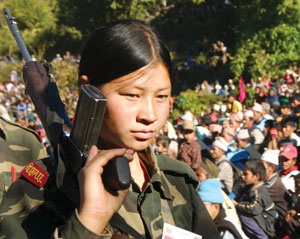 KIYOKO OGURA WHO IS WHO?: In Nepal as well as in Colombia, women formed a sizeable proportion of the fighting force. In the picture, a PLA combatant in Rolpa during Nepal's war. |
When I just arrived in Nepal, a friendly man at a small shop in Bhaisepati asked me where I was from. After I said Colombia, he replied with a grin: "Ah, the land of the FARC."
I was taken aback because normally few in Nepal have heard of Colombia (those that have think of the capital of Sri Lanka, or a university in New York) let alone a South American guerrilla group. That was the first time I realised that there may be a link between the conflicts in Colombia and Nepal.
Nepal is ahead of Colombia in guerrilla matters in some ways. It signed a ceasefire in 2006 and concluded the peace process with the Maoists, and the former combatants are in the process of integration into the national army and assimilation into society. The Maoists became the largest party in the 2008 elections, and have been leading the government.
In Colombia, FARC has just entered the peace process and the country has the dubious distinction of having one of the longest running conflicts in the world today. FARC has been fighting for the last 48 years and two generations of Colombians have never known peace.
News of the peace process has been greeted with hope and apprehension; after all, there have been failed peace attempts before. A recent public opinion poll showed that 75 per cent of Colombians welcome the peace talks, but 45 per cent do not hold much hope that it will succeed.
The last time there was a ceasefire in 1998, the President Andr�s Pastrana government gave an area of 42,000 sq km to the rebels as a safe haven in the southeast of the country, promising no military strikes there. The rebels took advantage of that to rearm, regroup, improve training and boost drug trafficking. They continued their urban offensives, extortion and kidnapping. Pastrana was also faulted for not having a clear plan about the process, and was naive in trusting the rebel group. The peace process collapsed within three years, but the straw that broke the camel's back was FARC's hijacking of an aircraft and kidnapping of a well-known politician.
After 12 years of strong military pressure by President Juan Manuel Santos and his predecessor, �lvaro Uribe, the rebels were weakened. The FARC is now internationally recognised as a terrorist group, it has fewer combatants, no new generation of leaders with communist ideology, and they are heavily dependent upon drug trafficking to survive.
They agreed to negotiate again with the government because they realised that they will never come to power by military means, and need to accept democracy. Many of the rebels are not interested in politics anyway, and seem to prefer the drug business.
This time the government has been more cautious and insisted on conditions for peace. It didn't offer any ceasefire and military operations against the FARC continue. Talks are not open to the public to avoid a media circus, and are not held in Colombia but in Norway and Cuba. The parties have agreed to talk on five points: rural and agricultural development, political participation, an end to the armed conflict, drug trafficking, and ensuring the rights of the victims of the conflict. The first point focuses on land reform, access to and use of land, formalisation of property, providing development to remote areas and creation of jobs. The end of the armed conflict includes a bilateral and definitive ceasefire, disarmament, releasing prisoners and reintegrating the guerrillas into society. Anti-drug trafficking activities include crop substitution, and environmental regeneration in areas affected by narco-traffickers. Victims of the conflict will also be ensured truth and justice.
 |
Juanita Malag�n is a Colombian journalist currently Online Coordinator of the digital edition
of Nepali Times,
www.nepalitimes.com
Read also:
Is revolution obsolete?, IGNACIO RAMONET in BOGOTA
After nearly 70 years of war, peace may be finally breaking out in Colombia


